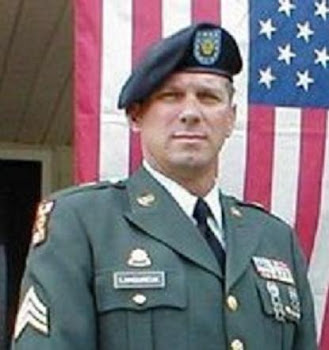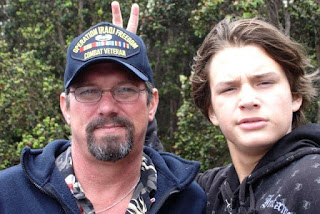Wednesday 13 May 2009
by: William Rivers Pitt, t r u t h o u t Columnist
There is disconnection between everything human and what has to be done in combat. Imagine being in an unimaginable situation and having to do the unthinkable. How can this be done? A detachment between everything human and having to do the inconceivable resounds in combat.
-
PTSD: A Soldier's Perspective - Scott A. LeeTwo men, ages 21 and 23, attempted to rob an Iowa farm. When two farmers, both 52, caught the two young men in the act, the farmers were savagely beaten and tied to a fence. The injuries incurred by the two farmers included skull fractures, facial fractures and a broken arm. The two men were arrested.
A 25-year-old man kidnapped his girlfriend at gunpoint in Tennessee. He forced her to drive to an ATM machine, took the money, drove her back to her home and then raped her. The man was later arrested.
A man in Massachusetts got into a fight with his wife and began drinking. Later that evening, he opened fire on a man and a woman outside a crowded nightclub. No injuries were reported. The man was later arrested.
A 35-year-old man in Colorado shot his wife five times in the head and neck and then shot himself. His wife was pregnant.
A 20-year-old man went on a beer run in Las Vegas at 1:00 AM, wearing a long black coat with an assault rifle tucked underneath. He was spotted by another man and a woman in an alley and told to leave. He opened fire on the man and woman, and returned to his apartment to get more ammunition. He was later arrested. The man and the woman were killed.
A 20-year-old man in Washington shot his 18-year-old girlfriend in the back of the head before turning the gun on himself.
A 19-year-old man in Washington stabbed his 18-year-old wife to death. He was later arrested.
A 37-year-old man in Virginia hanged himself with a bed sheet in his jail cell after being arrested for beating his wife.
A man from Portland, Oregon, was arrested after the body of his wife was found in a van. She had been shot through the throat.
A 31-year-old man in Washington was placed under a restraining order by his wife after he pushed her and threatened her. Two days later, the man drowned his wife in their bathtub.
A 36-year-old man in Colorado savagely beat his wife and threatened to kill her with a .357 Magnum. When police arrived on the scene, the man put the gun to his head and fired, killing himself.
A 25-year-old man in St. Louis hanged himself in his residence after he had been arrested for a domestic disturbance involving his wife.
There are thousands of stories just like this that have been taking place all over America.
Most people have not heard about them, but by now just about everyone has heard about this one: A 44-year-old man was arrested after killing five men inside a counseling center. This horrifying act happened at Camp Liberty, a massive US base in Iraq, and has been much in the news ever since.
All the other stories took place in America, but they all share one awful common factor: They were all acts of terrible brutality and violence committed by US soldiers, who had served either in Iraq or Afghanistan or both.
The soldier who shot five fellow troops in Iraq did so in a base clinic catering to service members suffering from post-traumatic stress disorder (PTSD). He had served three tours in Iraq. As with the other soldiers who committed the above-described crimes, he suffered from PTSD, and in the end, his disorder became the catalyst for savagery.
"They didn't tell him they were there for his benefit," said the man's father to a Texas news station, "they were there as a friend to him to find out if he had any psychological problems as a result of his third tour of duty. They didn't want him to come back home and kill his wife or himself and this kind of stuff. That's the worst thing they could have done because they trained him to kill. He had a short fuse when they antagonized him. And I guess he couldn't help himself."
PTSD is defined by the United States Department of Veterans Affairs as "A psychiatric disorder that can occur following the experiencing or witnessing of life-threatening events such as military combat, natural disasters, terrorist incidents, serious accidents, abuse, and violent personal assaults like rape.
People who suffer from PTSD often relive the experience through nightmares and flashbacks, have difficulty sleeping, and feel detached or estranged, and these symptoms can be severe enough and last long enough to significantly impair the person's daily life."
Indeed. The military has stated that at least one in five American soldiers who were deployed overseas to Iraq or Afghanistan suffer from some degree of PTSD. According to a recent report by Truthout journalist Dahr Jamail, "The US military has been medicating soldiers before they are redeployed to Iraq, in order to keep enough boots on the ground. An anonymous survey of US troops taken during Fall 2007, used as part of the data in the Army's fifth Mental Health Advisory Team report, found that 12 percent of combat troops in Iraq and 17 percent in Afghanistan were on prescription drugs that were mostly antidepressants or sleeping pills."
"Studies that go back to World War II," continued Jamail, "have found that combat veterans are twice as likely to commit suicide as people in the general population. Other lesser known distressing facts are that nine percent of all unemployment in the United States is attributed to combat exposure, as is 8 percent of all divorce or separation and 21 percent of all spousal or partner abuse. The impact of all this extends to behavioral problems in children, child abuse, drug and alcohol addiction, incarceration and homelessness, all of which have implication that go well beyond the individual and reverberate across generations. As both occupations continue into the indefinite future, we should not be surprised when we hear of more atrocities like what happened Monday in Baghdad, whether they occur in Iraq or in the United States."
How long will Iraq be with us, even after we leave? Evidence strongly suggests that the physical and psychological toll taken upon our soldiers and service members from their extended, savage, deadly and ultimately fruitless deployments to the wars of the Bush administration is enormous, and growing.
These soldiers volunteered to serve, and swore to give their lives in that service. In return, they have been torn apart, killed, maimed, and in far too many cases, driven to or past the edge of madness by what they saw and did Over There.
A wise person once said that any nation that cannot properly care for their veterans has no business making new ones. These, our newest generation of scarred soldiers, deserve far better than what they have received from the government and the nation they swore to defend. We sent them over there, and now they are marching home, some of them with Hell itself in their minds and hearts. They can, and must, be helped and healed.
We must get them out of Iraq, get them out of Afghanistan, get them home and get them well. They deserve nothing less from us, and it is the very least we can do for them.






